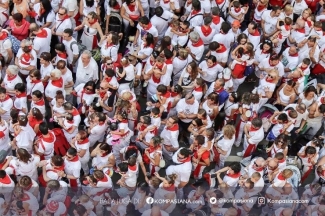By Fanny S. Alam
Coordinator of Bhinneka Nusantara Foundation Region Bandung
The inclining number of intolerance cases both in the levels of domestic and national has remained a number of questions, one of which is how the state of Indonesia with Pancasila and Bhinneka Tunggal Ika (Unity in Diversity) as the state's principles could experience the cases, predominantly in freedom of religions and beliefs as well as freedom of expression.
Back to history, a reflection towards the state's diversity values existence since the periods of Youth Pledge and pre-post independence is inevitable while at the same time presenting the interference of unity of diversity towards races, ethnicity, and religions in the state formation.
Therefore, it seems to be a huge confusion after 72 years of the state's independence to view why differences among races, ethnicity, religions now become a significant key as well as a high wall to be a restriction of various matters, such as education, public policies, for example regarding the building of other religions' worshipping houses, and politics.
It leads to various discrimnating and intolerant practices which will peak as bullying and violent actions conducted by majority groups of races, ethnicity, and religions to minority ones as well as to the ones within a difference of expression.
Intolerance As An Anomaly
The inclining number of intolerance cases in Indonesia presents a sharp anomaly along all the state's governance implementations nationally, unfortunately, the state's government from the central up to the lowest levels have not been considered strict to impose sanctions addressing the cases. As a consequence, each law violation associated with intolerance cases, predominantly in freedom of religions and beliefs as well freedom of expression effortlessly occurs through the society provocation against minority groups subsequently.
By the rank, West Java is considered the highest in conducting intolerance cases. Confirmed by Wahid Foundation, most intolerance cases emerging in the province have accomplished the toppest level, such as the rejection of St. Clara Church in Bekasi, the status quo determination towards 3 churches in Parung Panjang in the regency of Bogor due to the pressure of intolerant groups with the reason to maintain the area conduciveness, and the restriction as well as the enjoinment of Jemaat Ahmadiyah Indonesia's activities in Depok.
The latest is the suicide bomb in 3 churches in Surabaya on May 13, 2018 followed by some attacks to police headquarters in some main cities in Indonesia which later on question the government's serious willingness to finalize the revision of Act of Anti Terrorism.
Tolerance As A National Civilization
